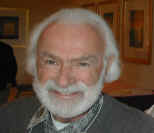
|
|
There have been two ideas that have inspired precise research into the relationship between mind and brain over the past half century. One, regnant during the 1960’s and 1970’s was the Fourier Hologram. The second, self-organization based on non-linear dynamics, began to flourish during the 1980’s and 1990’s. During this latter period I have tried to understand the relation between these two ideas. The first step was taken when we found that Gabor wavelets rather than Fourier transformations were the basis functions for brain holography. Gabor functions (or as Gabor called them, quanta of information) or some similar Hermite polynomials create a phase space by constraining (e.g. By a Gaussian envelope) the sinusoidal spectral aspects of holography. The next question to be answered is how this phase space (the phase space of quantum holography) relates to the phase space of non-linear dynamics. The answer is, I believe, through movement-- relative movement (through time and space) between the sensory trace memory of an organism and its current sensory input. The steps by which this relationship becomes established in vision will be detailed and evidence provided
Other Products by Karl Pribram 1) A Conversation With Karl Pribram
To View Comments or Join the Conversation: |
Most Viewed of all Products
Interhemispheric EEG Training: Discussion and Demonstration
|

